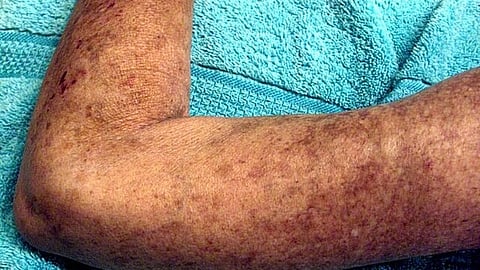

For patients with scleroderma, managing fatigue and sticking to a health routine can be challenging. Symptoms can be burdensome and overwhelming which make a daily schedule feel daunting.
But research published in the Arthritis Care and Research Journal from Michigan Medicine found that scleroderma patients made significant strides when working with trained peer health coaches in adhering to wellness routines, leading to resilience and improvements in fatigue, pain and depressive symptoms.
Participants in the clinical trial were randomized to either receive the Resilience-building Energy management to Enhance Wellbeing treatment, referred to as RENEW, or to participate in a control group where they managed symptoms as they usually would.
Participants in the RENEW group downloaded a mobile app that presented information on different health topics pertaining to patients with scleroderma.
In the RENEW app, participants were able to set goals and keep track of their progress.
The participants also spoke with trained peer health coaches regularly throughout the study about their personal goals for managing their symptoms as well as the obstacles they were facing when it came to reaching those goals.
“The peer health coaches were not health care providers, but instead people who also have scleroderma and have faced many of the same daily challenges,” said Susan Murphy, ScD, OTR, a professor of physical medicine and rehabilitation and a researcher in the division of rheumatology at University of Michigan Health as well as the lead author of the study.
“We found that having peer health coaches that had similar experiences with fatigue and pain helped participants feel understood when it came to talking about their personal obstacles for creating health routines.
“Scleroderma is a rare condition, and peer health coaches were skilled at helping others adjust their goals to meet their current needs given their own experiences having scleroderma.”
Each peer health coach met with their participant nine times over the course of 12 weeks.
The peer health coach and participant would discuss the participant’s goals, set a plan to achieve these goals, discuss their progress or adjustments that needed to be made and have peer to peer conversations about their experiences with scleroderma.
The peer health coaches also worked with participants to make sure that their health routine meshed into the daily life and activities of the participant.
This included becoming more active, being able to participate in pleasurable activities, and relaxing.
“Keeping a routine to manage pain and fatigue is important for those with scleroderma, but the symptoms of scleroderma make this hard to do for many patients,” said Murphy.
“Scleroderma patients need support when finding ways to manage their fatigue and pain. Eliminating the power dynamic of the doctor and the patient and having peer health coaches gave participants new insight into different ways they could manage their symptoms and helped them feel supported in their journey by creating a community connection.”
Murphy and her team aim to make the RENEW Scleroderma service available for public use to help patients with scleroderma around the country, but that’s still in the works.
The team also thinks this approach could be extended to people who have other chronic conditions.
“The goal is to help scleroderma patients enjoy their life with more energy and less pain,” said Murphy.
“We also found that people who participated in RENEW had better moods and felt they were more equipped to adapt when things got rough.
“Programs like RENEW may be an important tool to help patients manage their condition over time.” (MV/Newswise)
